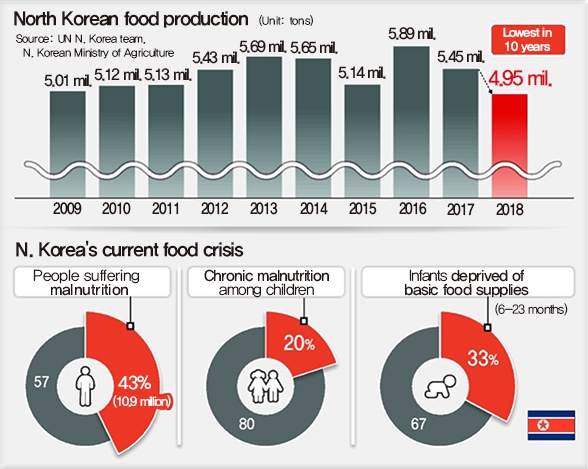 |
|
North Korean food production and current food crisis
|
Several international bodies voice concerns over food shortage
The Seoul Metropolitan Government is taking steps to provide a large amount of food and other humanitarian aid to North Korea, which is currently undergoing a food shortage. On May 1, the city announced a plan to provide emergency humanitarian aid to the North, which will include wheat and medical supplies. Seoul has reportedly secured substantial funds to cover the requisite costs. As of April 2019, Seoul holds 39.1 billion won (US$33.56 million) in its inter-Korean exchange and cooperation fund. That’s the largest sum controlled by any organization operated by a metropolitan or provincial government, with the exception of the inter-Korean exchange and cooperation fund operated by the central government. Though Seoul has prepared several programs related to inter-Korean relations, it has concluded that the most important of these is tackling the current humanitarian crisis. “There’s an urgent need for humanitarian aid for the lives of children in North Korea,” said Seoul Mayor Park Won-soon during an opening address at an academic conference marking the first anniversary of the inter-Korean summit on Apr. 24. The conference was jointly organized by the Hankyoreh Unification and Culture Foundation and the Korean Peninsula Peace Forum. “International bodies are quite concerned about North Korea’s food shortage. Children should no longer have to suffer because of adults’ political problems. The first thing we should be thinking about is protecting the lives and health of North Korean children, to make sure that they enjoy the spring of peace,” Park said. The North Korean government has emphasized self-reliance following the collapse of the North Korea-US summit in Hanoi, and it’s urging farmers to increase their output before the country’s main agricultural season. “Rice is more valuable than gold,” read the title of an article in the Apr. 29 issue of the Rodong Sinmun, the official newspaper of the Workers’ Party of Korea (WPK). This year, several international bodies have been voicing concerns about the food situation in North Korea. According to a report recently composed by the UN’s team in North Korea, staffed by UN bodies and international NGOs based in Pyongyang, the North’s total food production last year only amounted to 4.95 million tons, the lowest level in 10 years, since 2009. Rice and wheat production last year were down 12-14% from the previous year, while potato and soybean production also respectively decreased by 34% and 39%. Altogether, North Korea’s food production was about 1 million tons below target. The apparent reasons for the decline in production are the shortage of arable land, aging farming equipment, insufficient fertilizer, and a series of natural disasters. The UN report said that since North Korea had already been facing a long-term food crisis, a further decrease in production could cause even greater harm to vulnerable groups, including children, pregnant women, and the elderly. As much as 43% of North Koreans don’t have enough food, while about 20% of children suffer from chronic malnutrition. About one third of young children (6-23 months of age) don’t have reliable access to an appropriate amount of nourishment. Since South Korea’s central government has thus far been reluctant to send aid to North Korea because of sanctions on the North, the next question is whether Seoul’s large-scale aid plan will be able to clear away the obstacles to humanitarian aid. By Kwon Hyuk-chul, director of the Hankyoreh Peace Institute Please direct comments or questions to [english@hani.co.kr]






